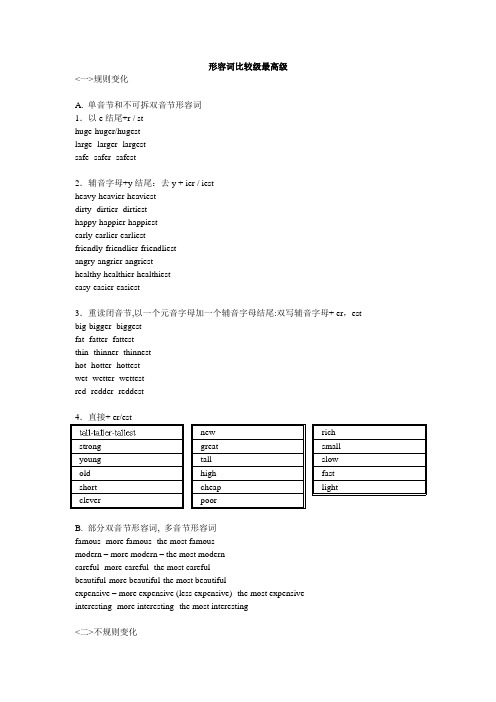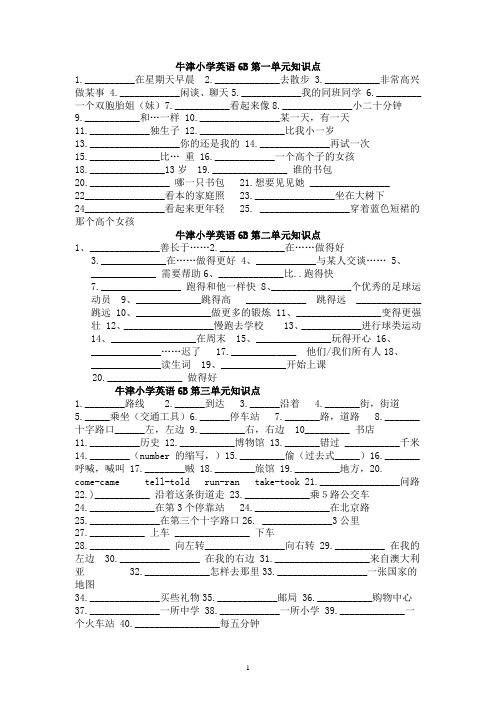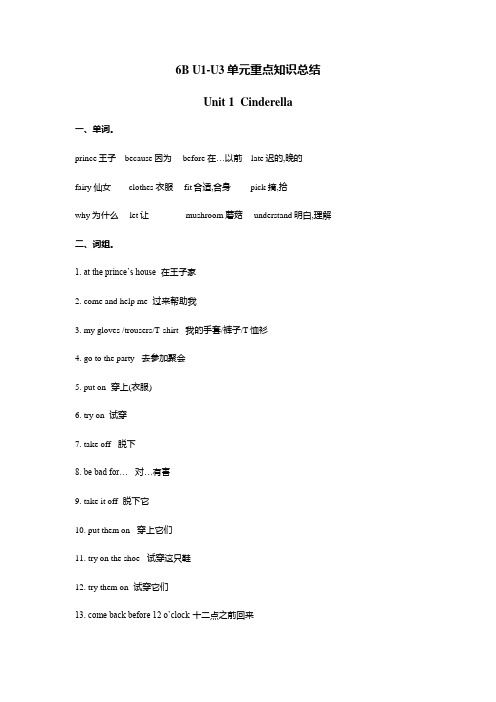【最新】牛津小学英语小学六年级英语6B知识点汇总
上海版牛津英语6B六年级基础语法复习整理

形容词比较级最高级<一>规则变化A. 单音节和不可拆双音节形容词1.以e结尾+r / sthuge-huger/hugestlarge- larger- largestsafe- safer- safest2.辅音字母+y结尾:去y + ier / iestheavy-heavier-heaviestdirty- dirtier- dirtiesthappy-happier-happiestearly-earlier-earliestfriendly-friendlier-friendliestangry-angrier-angriesthealthy-healthier-healthiesteasy-easier-easiest3.重读闭音节,以一个元音字母加一个辅音字母结尾:双写辅音字母+ er,est big-bigger- biggestfat- fatter- fattestthin- thinner- thinnesthot- hotter- hottestwet- wetter- wettestred- redder- reddestB. 部分双音节形容词, 多音节形容词famous- more famous- the most famousmodern – more modern – the most moderncareful- more careful- the most carefulbeautiful-more beautiful-the most beautifulexpensive – more expensive (less expensive)- the most expensiveinteresting- more interesting- the most interesting<二>不规则变化good/well-better –bestbad/badly/ill-worse-worstlittle-less-least + u. n. (few-fewer-fewest) + c. n.many/much-more –mostfar-farther-farthest (距离)far-further-furthest(程度)<四>too, very, quite, so, as…as,not as /so…as, less …修饰形容词原级very/quite tall(很高),too tall(太高)so tall(如此高)as tall as(与某人一样高)not as tall as /not so tall as(不如某人高)= less tall注意事项:1、形容词最高级前必须加the;副词最高级前可加the,也可不加thee.g. the biggest cities;draw (the) best2、much可修饰比较级:……得多e.g. much taller ……高得多3、原级标志:very非常;too太;quite相当;(not)as+原级+as (不)像……一样;less+原级不如……;so如此(共五个)时态填空(一) 常用固定词组:A型. doinglike doing/ love doing/ enjoy doing 喜欢做某事hate doing 讨厌做某事finish doing 完成做某事practise doing 练习作某事start doing / begin doing 开始做某事hat abo ut doing…? / How about doing…? 做某事怎么样?be good at doing 善于做某事be poor at doing 不善于做某事Sb. spend(s) some time doing sth. 某人花时间做某事remember doing 记住做过某事forget doing 忘记做过某事see sb. doing 看见某人正在做by doing 通过做某事by not doing通过不做某事stop doing 停止做某事instead of doing 而不是做某事go doingB型. to dowould like to do / want to do 想要做某事forget to do 忘记要做某事remember to do 记得要做某事have/has to do不得不做某事had to do不得不做某事will have to do 将不得不做某事plan to do 计划做某事ne's job is / was to do... 某人的工作是做某事like to do/love to do 喜欢做某事start to do / begin to do 开始做某事need to do 需要做某事don’t need to do/ don’t have to do 不需要做某事learn to do 学习做某事promise to do / promise not to do 保证做某事/保证不做某事tell sb. to do / tell sb. not to do 告诉某人做某事/告诉某人不做某事ask sb. to do / ask sb. not to do 叫某人做某事/叫某人不做某事It takes/took sb. some time to do sth.某人花时间做某事It’s time to do sth. 做某事的时间到了C型. doLet sb. do 让某人做help sb. (to) do 帮助某人做hy not do...? 为何不做......?would rather do / would rather not do 宁愿做/宁愿不做had better do / had better not do 最好做/最好不做can do 能做may do 可以做must do 必须做will do 将要做would do 想要做shall do 应该做should do 应该做can't do 不能做may not do 不可以做mustn't do 不准做won't do 将不做wouldn't do 将不做shan't do 将不做shouldn't do 不应该做needn’t do 不需要做(二) 五种常见时态:现在进行时公式:am/is/are +doing (现在分词)时间状语:now 现在listen 听look 看these days 最近eg.Look, they are planting trees.一般现在时(助动词do/does)公式:V. / V.+s/es/ies (动词原形或动词第三人称单数)时间状语:always 一直usually 经常often 常常sometimes 有时候once a week 每周一次four times a day 一天四次every year 每年How often 多久一次e.g.I usually take an underground to school.He often takes a bus home.一般过去时(助动词did)公式:V. +d/ed/ied或不规则(动词过去式)时间状语:yesterday 昨天yesterday evening 昨天晚上ten years ago 十年前last week 上个星期in the past 在过去just now 刚才e.g.Ten years ago, he moved to Japan.I sent a letter just now.4. 一般将来时(助动词will/shall)公式:am/is/are going to +V. , will /shall +V. 时间状语:tomorrow 明天next week 下个星期this weekend 这个星期in the future 在将来Soon 很快,不久in 15 years’ time 在15年后How soon 多久以后e.g.I will fly to America tomorrow.现在完成时(助动词have/has)公式:have/has +done (过去分词)时间状语:already 已经yet 尚never 从未ever 曾经just 刚才once 一次before 在......之前for 6 years 6年how long 多久e.g.I haven’t read this newspaper yet.ary has already packed her things.及思维机智)等。
牛津小学英语六年级下册6B单元知识点整理及要求

牛津小学英语6B第一单元知识点1.__________在星期天早晨2._____________去散步3.___________非常高兴做某事4.____________闲谈、聊天5.____________我的同班同学6._________一个双胞胎姐(妹)7.___________看起来像8.______________小二十分钟9.___________和…一样 10.________________某一天,有一天11.____________独生子 12._________________比我小一岁13.__________________你的还是我的 14.______________再试一次15.______________比…重 16.____________一个高个子的女孩18._______________13岁 19._______________ 谁的书包20.________________ 哪一只书包 21.想要见见她 ________________22________________看本的家庭照 23.________________坐在大树下24________________看起来更年轻 25. __________________穿着蓝色短裙的那个高个女孩牛津小学英语6B第二单元知识点1、______________善长于……2._____________在……做得好3._____________在……做得更好 4、____________与某人交谈…… 5、_____________ 需要帮助6、_____________比..跑得快7.________________ 跑得和他一样快 8、________________个优秀的足球运动员 9、_____________跳得高 ____________ 跳得远 _____________跳远 10、_______________做更多的锻炼 11、_________________变得更强壮 12、__________________慢跑去学校 13、____________进行球类运动14、_________________在周末 15、_______________玩得开心 16、______________……迟了 17._____________ 他们/我们所有人18、______________读生词 19、_____________开始上课20._______________ 做得好牛津小学英语6B第三单元知识点1.________路线2.______到达3.______沿着4._______街,街道5._____乘坐(交通工具)6.______停车站7._______路,道路8._______十字路口______左,左边9._________右,右边 10_________ 书店11.__________历史 12.___________博物馆 13._______错过 ___________千米14.________(number 的缩写,)15._________偷(过去式_____)16._______呼喊,喊叫 17.________贼 18.________旅馆 19._________地方,20.come-came tell-told run-ran take-took 21.________________问路22.)___________ 沿着这条街道走 23._____________乘5路公交车24._____________在第3个停靠站 24._______________在北京路25.______________在第三个十字路口26. ______________3公里27.___________ 上车 _______________ 下车28.________________ 向左转________________向右转 29.__________ 在我的左边 30.________________ 在我的右边 31.___________________来自澳大利亚 32._____________怎样去那里33.__________________一张国家的地图34.______________买些礼物35.____________邮局 36.___________购物中心37.______________一所中学 38.____________一所小学 39._____________一个火车站 40._________________每五分钟41._________________跑出商店42._________________ 上周六下午43.________________ 跟着他 45.________________ 偷我的钱包46._______________拦住了小偷47._______________ 中国银行6B 第五单元知识点1.____________ 去纽约2.______________ 下一周3.____________那里工作一年 4. _____________了解天气 5. ________________ 最好的季节6._________________问有关…的问题7.________________在乡下8._____________纽约的天气 9.__________________ 摘苹果10._________ 听起棒 11. _________________大部分时间12.____________堆雪人13.___________ 一些更保暖的衣服14.____________(指植物)变绿15._______________ 去划船16._____________变得更长17._________ 将要,打算18.______________在夏天19.________________ 既凉爽又晴朗20. ________________哪个季节21.___________________ 许多雪22._______________寒风23.____________________ 好天气Unit 6 知识点1.____________上课;有课2.________________野餐3. _______________我很愿意…4.______________去远足5._____________顺便地6.______________看戏剧演出7._______________看京剧8.________________在周六上午9._________参加运动会10._________________ 制定计划11____________________班级课题12.________________他们的周末计划13.__________________在音乐会上14.________________明天下午15._______________举行音乐会16._______歌咏比赛17 __________________ 端着黄碗的女孩6B Unit 7知识点1._____________信2. ___________笔友3.__________胶水(不可数)4.________纸5.________信封6._______(两者)都7.________ 地址9.________明信片10.________传真;传真机11.__________ 机器 12.________结束;完成13.__________每件事;一切14.__________昨天15._______希望,愿望16.______湖:17.________________给Peter写信18.________________做一只风筝19._______________做我的回家作业20._______________________一个电话号码21._________________一些信纸22.________________________昨天下午23__________________ 小学毕业24.__________________ 升入中学25._______________在报纸上26._________________听音乐27.__________我特别喜爱的科目28.________________要求得到29.____________________在金陵小学。
译林牛津英语6B知识点

六下6B Unit 1 The lion and the mouse 知识点梳理一、短语1.make a study plan 制定学习计划2. in the forest 在森林里rge and strong大和强壮4.one day 一天5. walk by 走过;路过6. wake up 醒,醒来 wake sb up 把某人叫醒7. be angry with sb 对某人生气 be angry at sth 对某事生气8. want to do sth 想要做某事 want sb to do sth 要某人做某事9. some day 某一天 10. say quietly 小声地说11. so small and weak这么小和弱 12. the next day 第二天13. laugh loudly 大声地笑 laugh happily开心地大笑14. let sb do sth 让某人做某事 let the mouse go 让这只老鼠走开15. catch the lion with a large net 用一口大网捉住狮子16. bite the net with sharp teeth 用锋利的牙齿咬网17. get out 出来,出去 get out from the net破网而出help the lion get out帮助狮子逃脱18. ask sadly 难过地问,伤心地问 19. just then 就在那时20.make a big hole in the net with his teeth 用他的牙齿在网上弄了一个大洞21. say happily 开心地说, 22. from then on 从那时起23. become friends 成为朋友 become good friends成为好友24.a happy boy 一个快乐地男孩 25. say excitedly 兴奋地说,激动地说26.sweet shop甜品店 27. the boy over there 那边的那个男孩28. It doesn’t matter. 没关系。
牛津小学英语6b单元知识点整理及要求[1]
![牛津小学英语6b单元知识点整理及要求[1]](https://img.taocdn.com/s3/m/9b315ab10b1c59eef8c7b4ea.png)
牛津小学英语6B第一单元知识点整理及要求一、熟记本课词组、会听写部分重要词组。
1.on Sunday morning 在星期天早晨2.go for a walk去散步(take a walk散步)3. be glad to do sth. 非常高兴做某事4. have a chat 闲谈、聊天5. my classmate 我的同班同学6. a twin sister 一个双胞胎姐(妹) twin sistersaa双胞胎姐妹7. look the same 看起来一样,看起来很像8. twenty minutes younger小二十分钟9. as…as 和…一样 as old as 与…..一样大10. one day某一天,有一天11. the only child 唯一的孩子,独生子the only child in your family你家里唯一的孩子12.one year younger than me 比我小一岁13. yours or mine 你的还是我的14. try again 再试一次 15. bigger than…比…大16. heavier than…比…重 17. a tall girl 一个高个子的女孩18. thirteen years old 13岁 19. whose school bag 谁的书包20. which school bag 哪一只书包21. want to meet her想要见见她22. look at Ben’s family photo看本的家庭照23.sit down under a big tree坐在大树下24. be the goalkeeper 成为守门员25. twelve centimeters 12厘米26. the same age 同样的年龄 27. look younger 看起来更年轻28. the tall girl in the blue skirt 穿着蓝色短裙的那个高个女孩二、初步理解掌握本课语法知识。
小学英语6B Module1短语及句型(上海版牛津英语)

小学英语6B Module1 短语及句型本文档整理了小学英语6B Module1的短语及句型,适用于上海版牛津英语教材。
一、单词短语1. 人称代词•I(我)•you(你)•he(他)•she(她)•it(它)•we(我们)•they(他们/她们/它们)2. 动词短语•clean up(打扫干净)•come in(进来)•go out(离开)•have a picnic(野餐)•have a rest(休息)•help with(帮助)•make a snowman(堆雪人)•play basketball(打篮球)•ride a bike(骑自行车)•run fast(跑得快)•speak English(说英语)•swim well(游泳游得好)•take photos(拍照)•wait for(等候)3. 名词短语•a kite(风筝)•a photo(照片)•a picnic(野餐)•bed time(就寝时间)•lunch time(午餐时间)•rest time(休息时间)•winter holiday(寒假)•summer camp(夏令营)•the park(公园)•the zoo(动物园)4. 形容词短语•big and strong(又大又壮)•happy and excited(快乐兴奋)•hot and sunny(炎热晴朗)•cold and windy(寒冷多风)5. 副词短语•at home(在家)•at school(在学校)•in the park(在公园)•in the zoo(在动物园)二、句型1. 一般句型•I like playing basketball.(我喜欢打篮球。
)•He is good at swimming.(他擅长游泳。
)•They speak English well.(他们英语说得好。
)•We have a picnic in the park.(我们在公园野餐。
牛津小学英语6B教学重难点归纳

牛津小学英语6B教学重难点归纳一、语法1. 一般过去时态一般过去时态是表示过去发生的动作或存在状态的一种时态。
在牛津小学英语6B教学中,学生需要掌握一般过去时的构成和用法,并能够准确地运用于句子中。
在构成方面,一般过去时态的动词只需在原形动词后加上-ed。
然而,也有一些特殊情况需要注意,如不规则动词的过去式形式不遵循规则;而以辅音字母+y结尾的动词,则要将y改为i,再加-ed。
在用法方面,一般过去时可用于肯定句、否定句和疑问句中,需要注意的是在肯定句中要注意动作或状态与过去时间的对应。
同时,在句子中使用适当的过去时间状语词,如yesterday, last week, three days ago等,以明确动作或状态发生的具体时间。
2. 句型转换在牛津小学英语6B教学中,学生需要进行句型转换,将一种句型转换成另一种等价的句型。
这对于学生的语言运用能力和句子结构的理解都具有重要意义。
常见的句型转换包括:•肯定句转否定句:将肯定句中的动词前加上否定词not,或使用didn’t + 原形动词的形式。
•否定句转肯定句:将否定句中的动词not去掉。
•一般疑问句转否定疑问句:在一般疑问句的基础上加上否定词not。
•陈述句转特殊疑问句:将陈述句中的疑问词移至句首并添加疑问词后续的句子结构。
学生在学习句型转换时,需要掌握各种句型的构成和变化规则,通过大量的练习确保句型转换的准确性和流利性。
二、词汇1. 动词短语在牛津小学英语6B教学中,动词短语是非常常见的一种词汇形式。
动词短语由一个或多个动词和附加的其他成分组成,能够在句子中起到一个整体的动词的作用。
动词短语可以是及物动词短语或不及物动词短语。
在使用时,学生需要注意动词短语的正确构成和用法,以确保表达的准确性。
2. 名词性词汇名词性词汇在牛津小学英语6B教学中也是重要的学习内容。
名词性词汇包括名词、代词和数量词等。
学生需要掌握名词的单复数形式、代词的主格、宾格和所有格形式,以及数量词的用法和搭配。
牛津小学英语小学六年级英语6B语法汇总

6B语法汇总两个音节以内形容词比较级的构成方式:1.一般在单词的结尾加“-er”,例如:tall – taller young – younger 2.以e结尾的单词,结尾加“-r”,例如:wide – wider3.结尾是重读闭音节,而且结尾只有一个辅音时,双写这个辅音再加“-er”,例如:big – bigger, hot – hotter4.结尾是辅音加y时,则将y改为i,再加“-er”,例如:heavy – heavier 不规则的形容词比较级:good – better many / much – more bad – worse形容词比较级句型的用法:用于两者比较的句子中,常与介词than连用。
句式:名词(人称代词主格) be 形容词比较级 than名词(人称代词宾格)陈述肯定句: Su Yang is younger than Su Hai.否定句: Su Yang isn’t younger than Su Hai.一般疑问句: Is Su Yang younger than Su Hai?特殊疑问句: Who is younger than Su Hai?两者的同级比较(as … as 结构)句式:名词(人称代词主格)be as 形容词原级 as名词(人称代词宾格)陈述肯定句: Su Yang is as young as Su Hai.否定句: Su Yang isn’t as young as Su Hai.一般疑问句: Is Su Yang as young as Su Hai?特殊疑问句: Who is as young as Su Hai?两个音节以内副词比较级构成方式(参照形容词比较级构成方式)不规则的副词比较级:well – better far – farther副词比较级句型的用法:句式:句式:名词(人称代词主格)行为动词副词比较级 than名词(人称代词宾格)例1陈述肯定句: I jump higher than Liu Tao.否定句: I don’t jump higher than Liu Tao.一般疑问句: Do you jump higher than Liu Tao?特殊疑问句: Who jumps higher than Liu Tao?例2陈述肯定句: Liu Tao runs faster than me.否定句: Liu Tao doesn’t run faster than me.一般疑问句: Does Liu Tao run faster than you?特殊疑问句: Who runs faster than you?be going to (do sth.) 打算做某事1)表示现在的意图,即打算在最近或将来进行某事,例如:We are going to post the letter.2)表示现在已有迹象表明将要发生或即将发生某种事态,例如:I must hurry, I’m going to be late.(常与tomorrow, next week, next year等将来时间连用)用法:陈述肯定句:We are going to give a puppet show next week.否定句:We aren’t going to give a puppet show next week.一般疑问句:Are you going to give a puppet show next week?特殊疑问句:Who is going to give a puppet show next week?What are you going to do next week?。
牛津译林版六年级英语下册6B U1-U3单元重点知识总结

6B U1-U3单元重点知识总结Unit 1 Cinderella一、单词。
prince王子 because因为 before 在…以前 late迟的,晚的fairy 仙女 clothes 衣服 fit合适,合身 pick 摘,拾why 为什么 let让 mushroom 蘑菇 understand明白,理解二、词组。
1. at the prince’s house -在王子家2. come and help me -过来帮助我3. my gloves /trousers/T-shirt -我的手套/裤子/T恤衫4. go to the party -去参加聚会5. put on -穿上(衣服)6. try on -试穿7. take off -脱下8. be bad for… -对…有害9. take it off -脱下它10. put them on -穿上它们11. try on the shoe -试穿这只鞋12. try them on -试穿它们13. come back before 12 o’clock-十二点之前回来14. be sad /happy -伤心/开心15. have a good/great time -玩得开心16. at the party -在聚会上17. have to do sth. -不得不做某事18. have to come home -不得不回家19. visit every house -拜访每一户20. fit sb well -很适合某人21. at 12 o’clock -在十二点22. put on the English play -表演(演出)这个英语剧23. have a drink -喝饮料24. draw a dress for her friend -为她的朋友画一件连衣裙25. read stories -读故事26. have some snacks -有一些零食27. at a snack bar -在零食店28. thirsty and hungry Bobby -饥渴交加的波比29. in the forest -在森林里30. find some mushrooms -发现一些蘑菇31. under the tree -在树下32. pick a big red mushroom -摘了一个又大又红的蘑菇33. pick up the book =pick the book up-捡起这本书34. pick them up -把它们捡起来35. leave a shoe behind -把一只鞋子留下了36. don’t understand why -不明白为什么37. foot hurts -脚疼38. be bad /good for… -对…有坏处/好处39. have to -不得不,必须40. leave…behind -留下;丢下41. have some nice clothes and shoes -有些漂亮衣服和鞋子42. don’t have any nice clothes or shoes -没有漂亮衣服和鞋子43. put on the new clothes= put the new clothes on-穿上新衣服44. take off his white jacket=take his white jacket off -脱下他白色的夹克衫三、句型。
- 1、下载文档前请自行甄别文档内容的完整性,平台不提供额外的编辑、内容补充、找答案等附加服务。
- 2、"仅部分预览"的文档,不可在线预览部分如存在完整性等问题,可反馈申请退款(可完整预览的文档不适用该条件!)。
- 3、如文档侵犯您的权益,请联系客服反馈,我们会尽快为您处理(人工客服工作时间:9:00-18:30)。
(6B)Unit 1Who is younger?一、单词:**** than 比,chat聊天,young年轻的old年老的strong 强壮的fat 胖的thin 瘦的heavy 重的light 轻的short短的、矮的long 长的tall高的small小的big大的sit(sat)坐meet(met)遇见、见面***twin (双胞胎)之一as 作为minute 分钟only惟一的、仅有的child孩子(children孩子们)little小的cute 伶俐的、可爱的also 也**centimetre 厘米height身高 weight体重worm蠕虫二、词组:1.on Sunday morning 在星期天早晨2.go for a walk 去散步3. look the same 看起来一样4. one day 某一天5.as tall as 与…..一样高as fat as 与…..一样胖as long as 与….一样长6. shorter than… 比….矮bigger than比…大heavier than比…重7. twenty minutes younger小二十分钟 8.one year older 大一岁9.sit down under a big tree 坐在大树下 10.be glad to do 非常高兴做某事11.see them/him/you 看见他们/他/你 12.look different 看起来不同13.a twin sister 双胞胎姐妹 14.my classmate/deskmate我的同班同学/同桌15.how old 多大16.the only child 仅有的一个孩子17.a cute little dog一只可爱的小狗 18.get a brother 得了个弟弟19.a tall boy 一个高个子的男孩 20.a young teacher 一位年轻的教师21.some heavy boxes 一些重的盒子 22.whose classroom 谁的教室23.your old friend(s) 你的老朋友 24.a heavy schoolbag 一只重的书包25.a strong goalkeeper 一个强壮的守门员26.brothers and sisters 兄弟姐妹27.the girl in red 穿红衣服的女孩 28.yours or mine 你的还是我的29.look young 看起来年轻 30.have a chat 聊天、闲谈31.asksome queations问一些问题三、形容词比较级:A.直接加er/rtall---________light----________young--_________old---________strong--___ small--_________late---_________long---_________short--________B.双写加er big-------_________ fat-----_________ thin---________C.去y改i加er heavy---_________四、句型:1、Who’s younger than him ? 谁比他年轻?My brother is younger than him . 我弟弟比他年轻。
2、Are you as tall as Tom ? 你和汤姆一样高吗?3、Do you have any brothers or sisters?Yes,I do .No,I don't. I have a brother./I have a sister.4、Whose schoolbag is heavier,yours or mine ?Mine is./My schoolbag is heavier than yours .五、音标:or / / word workbook world worm work workerir / / shirt skirt girl bird birthday first third thirtyur / / turn nurse surfUnit 2More exercise一、单词****low低high高slow慢fast快late晚early早far远well 好/语气词bad糟糕的、坏的true正确的fish鱼(goldfish金鱼)***exercise练习matter事件problem问题player运动员,演员worry担心idea主意jog慢跑will将**traffic 交通二、词组:1. be good at 擅长2.do well in 擅长(do better in 更擅长)3.do more exercise做更多的锻炼4.as strong as 和…一样强壮5.the other children 其他的孩子6.want to do better 想做得更好7.What’s the matter?怎么啦?8.well done 做得不错、干得好9.run faster than me 跑得比我快 10.run as fast as him 跑得和他一样快11.a good football player一个好的足球运动员 12.jump very high跳得很高13.do other things better than your classmates做其他事情比你的同班同学好14.jump higher than 跳得比…高15.That’s true.对的。
16.some of the boys 某些男孩17.Don’t worry.别担心。
18.get stronger变得更强壮 19.a good idea一个好主意20.jog to school慢跑去学校 21.play ball games玩球类运动22.read better than all of us 读得比我们所有人好23.want to do=would like to do想要做...24.read the new words for the class为全班同学读生词25.get up earlier 更早的起床 26.every day 每天27. after school 放学后 28.start our lesson 开始上课29.all the other children 所有其他的孩子三、副词比较级(用于行为动词后面):直接加er/r:low-_______slow-_______high-________ fast-______late-______去y改i加er:early-earlier不规则变化:far-farther, well(good)-better , much/many-more bad-worse四、句型:I get up early than you.我起床比你起得早。
Ben runs faster than Jim.本跑得比吉姆快。
Do the boys jump higher than the girls? Yes, they do.男生们跳得比女生们高吗?是的。
Does Jim swim slower than David? 吉姆游得比大卫慢吗?No, he doesn’t. David swims slower than Jim.不,大卫游得比吉姆慢。
I’m goo d at Chinese.=I do well in Chinese.我擅长语文。
(I am not good at Chinese.=I don’t do well in Chinese.)Jim is good at English. =Jim does well in English.吉姆擅长英语。
(Jim isn’t good at English.=Jim doesn’t do well in Chinese.)Jim is not as strong as the other boys. 吉姆不如其他男生强壮。
Mike runs as fast as Ben.迈克跑得和本一样快。
I think you do other things better than your classmates.我认为你做其他事情比你同班同学好。
The traffic was heavier than yesterday.交通比昨天拥挤。
五、音标:or/ / forty horse morning sports for shortUnit 3 Asking the way一、单词:****get到达way路away离开along沿着street大街crossing交叉路口stop停车站miss 找不到、错过walk路程post office邮局bookshop书店(shoeshop鞋店toyshop玩具店fruitshop水果店)run-ran跑catch-caught抓tell-told告诉***kilometre千米、公里history museum历史博物馆city城市shopping centre购物中心middle school中学primary school小学No.=number第…号train station火车站bus station汽车站road街道、路**suddenly突然steal(stole)偷out of在…外shout大声喊叫thief小偷bank银行hotel宾馆place地方river河二、词组:e from 来自于……2.live in China 住在中国3.on holiday 度假4. get there 到达那里5.get to your home到你的家6.go to the city post office 去市邮局7.tell me the way to 告诉我去……的路 8.let me see 让我想想9.go along this street 沿着这条街走 10.turn right / left 向右/ 左转11.at the third crossing 在第三个十字路口 12.on your left 在你的左边13.you can’t miss it .你不要错过。
14.how far 多远15.a kilometre away 一公里远 16.a long/short walk 一段很长/短的路17.take bus No. 5 乘5路车 18.how many stops 多少站19.at the bus stop 公共汽车站 20.every five minutes 每隔五分钟21.on River Road 在大江路 22.in Shanghai Street 在上海街23.get on 上车 24.get off at the third stop 在第三个车站下车25.You’re welcome. 不客气/不必谢。
